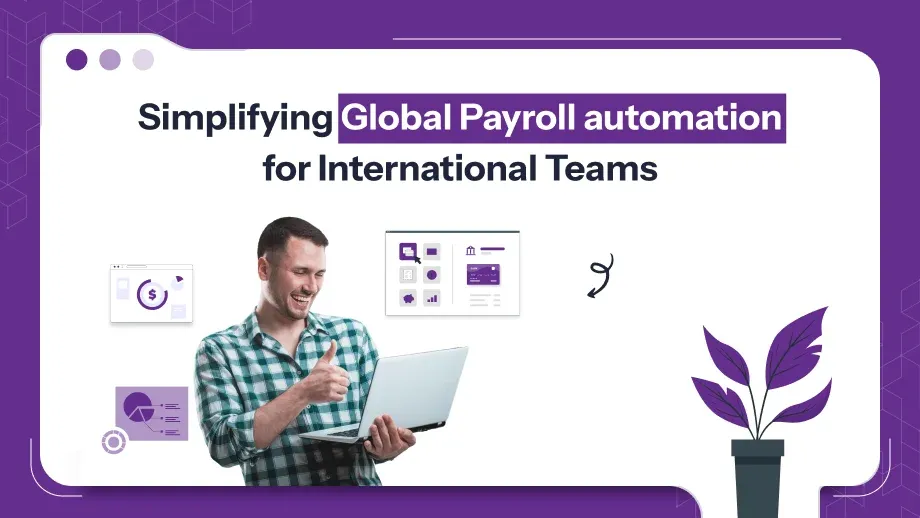
International team payroll management can be a highly daunting task. Every country has its rules, tax regulations, labor laws, and payroll payment structure. Companies working across borders will find it really challenging to stay up to date with all of this information while making timely payments. Global payroll automation is something that can bring about a great change in the process.
What is global payroll automation?
Global payroll automation is the application of computer programs or digital platforms to manage payroll operations across many nations. Unlike human activities such as wage computations, tax paperwork, and benefit deductions, payroll automation leverages computers to perform these duties effortlessly and precisely whilst after to regional regulations.
At its foundation, global payroll automation aims to reduce human error, improve productivity in operations, or alleviate the administrative tasks associated with handling a worldwide workforce. This also lowers fraud as well as information breaches by providing safe, cloud-based services to combine all payroll data into one location. An automated payroll system allows organizations to concentrate on development and creativity while technologically solves all aspects of payroll.
How Does Global Payroll Automation Differ from Standard Payroll Automation?
Whereas traditional and global payroll automation serve the same basic objective of automating payroll activities, the difference is in complication und range.
Standard Payroll Automation:
Commonly, standard payroll automation covers domestic payroll for those companies working within one country. In this context, the process often will include salary determination, taxing the paycheck management, generating payslips, and statutory benefit deduction. Generally speaking, standard payroll systems are easier to implement since they need to account for only one set of national tax and labor laws.
International Payroll Automated:
Global payroll automation, however, is specifically designed for companies with employees worldwide. Being much more complex than local payroll automation, it requires the adaptation of tax systems, labor regulations, different currencies, and payment structures across various countries.
A good global payroll solution will seamlessly integrate with multiple HR platforms, time and attendance systems, and expense management tools so that a business can manage its payroll for international teams all in one place.
Global payroll solutions also deal with continuous compliance updates automatically by changing according to changes in local laws and regulations.In essence, whereas standard payroll automation deals with routine payroll functions, global payroll automation offers a more complete solution in dealing with the different kinds of a global workforce.
Key Benefits of Global Payroll Automation
Adopting global payroll automation presents numerous benefits for companies, especially those having teams dispersed in different regions. Here are some key advantages:
Fast and Efficient Payments
One of the primary benefits of global payroll automation is being able to pay employees and contractors throughout the world swiftly and effectively. Automated payroll solutions enable you to handle pay in minutes, regardless of time zone or currency.
The technology calculates pay, translates currencies, and ensures that each employee receives precisely what they deserve, keeping the process simpler and quicker.
These procedures also serve to guarantee compliance with local labor laws, lowering the likelihood of fines or penalties for erroneously paying wages or failing to shell out the required taxation.
Simplified Reporting and Insights
Payroll automation centralizes all your data payroll into one cloud-based platform, making reporting easier and more efficient. Rather than gathering data from different regions manually, businesses can have real-time access to up-to-date information on payroll expenses, tax contributions, benefits deductions, and other essential data.
Take the next step in global payroll automation!
Reach out now to discover how we can optimize your payroll process across many countries.
Global Benefits Management
Complexity due to varying laws and regulations across different countries makes benefits administration to multi-national employees difficult. Payroll automation integrates with benefits management tools to ensure that all health insurance, retirement plans, stock options-are managed in conformance to local regulations. Such a scheme will enable the business to develop a global benefits package in light of the available packages in each country.
Cloud-Based Efficiency
Cloud technology has an advantage in automating payroll functions. Moving all payroll processes into the cloud ensures that companies can operate at scale with no constraints by the system. They can easily increase the number of countries they include, track transactions across borders, and manage the data more conveniently. It also leaves less burden on the HR teams and the IT departments, as cloud-based solutions require a lot of minimum maintenance and infrastructure.
Management of Global Equity and Incentive Programs
Businesses that use equity incentives or issue stock options to workers in various countries can make use of payroll automation to streamline their management. Vesting schedules will be tracked by automated solutions and tax implications will be calculated. Furthermore, automated compliance with both local and international laws may be ensured in this regard to reduce the complexity in managing these programs and ensure correct tax guidance is provided to the employees.
Simplifying Time and Leave Tracking
Payroll automation systems might be combined with attendance and time tracking technologies to ensure workers get compensated correctly based on their hours worked, overtime, and leave. This is especially important for foreign teams, as various countries have different laws encompassing paid time off (PTO) and vacation. Automation ensures that employees receive the correct amount of leave without the need for manual tracking.
Streamlined Tax Filing
Tax filing is another area where global payroll automation proves invaluable. Businesses can use an automated system to figure out the correct payroll deductions for each employee, depending on current local tax legislation. These systems may also submit taxes immediately, ensuring compliance while lowering the likelihood of errors or tardy timeframes.
Assistance around the clock
A respected global Payroll Service In India gives immediate assistance to help businesses manage issues and answer requests, irrespective of where their employees are situated. Automation can notify HR staff of any processing concerns, such as inaccurate data or discrepancies, allowing users to rectify the matter swiftly.
Key Payroll Tasks You Can Automate
Payroll automation can undertake a variety of tasks that will save businesses significant time and effort. Some of the key payroll tasks that can be automated include the following:
Pay Calculations: Automated payroll systems calculate wages, including regular pay, overtime, and bonuses, based on employee data such as working hours, contracts, and pay rates.
Tax Deductions: The automation system automatically switches to local tax laws and computes the correct amount of tax to be deducted for each employee, thus making the chance of errors a lot lower.
Benefit Deductions: Payroll automation systems often deduct employee health insurance coverage, retirement contributions, and other available benefits.
Time and Attendance: Automation tracks the presence of employees and day-offs, integrating all the information directly into the payroll, thus avoiding incorrect payment of the employee.
Payroll Processing: The automatic processing of payroll produces payslips, initiates direct deposit payments, and carries out all the payroll activities in a single instance.
Payroll Reports: The automation tools create comprehensive reports about the payroll expenditure, tax deduction, and benefits so that a business can be able to know the performance.
Compliance Reporting: The automated payroll ensures compliance reporting, such as tax forms and year-end reports. In this way, the international regulation compliance will be ensured.
How to Automate Global Payroll
To successfully automate global payroll, businesses should follow some key steps:
Choosing the Right Payroll Provider
The first step in automating global payroll is choosing the right provider. It’s essential to select a payroll solution that offers specialized services for global operations. A provider like Remote offers an all-in-one platform for managing international payroll, tax compliance, and benefits, and international calling. Look for a provider that integrates with your existing HR tools and offers the flexibility to handle multiple countries and currencies.
Look for Key Features
Payroll automation systems, in evaluating the options, must offer basic features that include:
Payroll Visibility: The system has to provide the necessary information about the payroll activities, schedules, and tasks.
Transparency: A good payroll solutions would be able to give the businesses a chance to track their deductions, taxes, and benefits in complete transparency.
Granular Control: Ensure that the system can manage all different payroll elements such as bonuses, salary adjustments, and PTO.
Instant Updates: The system should update employee data in real time to avoid mistakes in the payroll process.
Centralize Your HR Data
The payroll automation process is a success only if there is centralized data. It allows storing all the information of the employees, such as salary, benefits, and tax details, in one safe platform, making payroll tasks more streamlined and error-free in all regions.
Take Expert Guidance
Payroll providers with international expertise can provide important insight into local tax legislation, labor rules, and payroll procedures. Make use of your payroll supplier’s experience to stay compliance while avoiding costly errors.
How Long Does It Take to Automate Global Payroll?
This varies with the size of your company, the complexity of your payroll system, and countries of operation. In general, the implementation time is between six weeks and a few months. The latter includes setting up the system, migrating data, training stakeholders, and configuring payroll for each country.
Conclusion
Global payroll automation is one of the powerful solutions that companies with international teams need. It is accurate, compliant, and efficient while minimizing the burden of payroll management across various countries. By automating the payroll system, a company can streamline operations, enhance financial reporting, and offer better benefits to employees, regardless of where they are based.
If you wish to streamline your payroll software and avoid international regulatory complications, you could consider hiring the services of a reliable payroll company like Remote. With professional expertise and high-technology automation, you will have ample time to build your business, while all your payroll problems will be left in the hands of experienced professionals.









